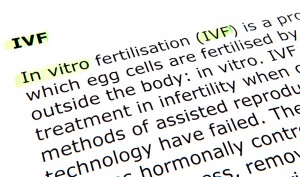The number of In-Vitro Fertilization (IVF) procedures performed each year is rising as 1 in 7 couples suffer from infertility. IVF can be a very stressful process, both mentally and physically, and can have a detrimental impact both on individuals and relationships. There are a number of steps that couples can take to ensure that they are fully prepared for IVF and also to increase the chance of success.
Tip #1: Build up a really good support network.
IVF is going to test you both and having people you can talk to, for advice or just to sound off to, will be invaluable. You will have each other but try to confide in supportive friends and family members as well to get a perspective from someone not directly involved in the process. Don’t underestimate the support you can also get from complete strangers by joining one of the numerous IVF / infertility internet groups and messageboards to learn from others’ experiences and ask questions in a safe environment. Many websites have sections for members to publish treatment diaries so you can understand what is involved in each step of IVF.
Tip #2: Clear your schedule.
The lead up to IVF is very time-consuming with many appointments, blood tests, scans and injections. The timings for these are often very precise and determined by the woman’s menstrual cycle. Do as much as you can to ensure that these can be accommodated by not planning long trips away or big events. Your life shouldn’t be put on hold, just calm it down for a few months!
Tip #3: Consider complementary therapies.
Consult your clinic and your doctor to find out if they recommend any therapies to support your IVF procedure. Acupuncture has been shown in many studies to increase the success rate of IVF by building up the lining of the uterus, helping follicles to develop and encouraging implantation. If you are considering acupuncture, make sure you consult an acupuncturist who specializes in fertility issues. Other therapies, such as hypnotherapy and reflexology, can help by reducing overall stress levels.
Tip #4: Take steps to improve your health.
Tobacco smoke has been found to contain at least 30 chemicals that can adversely affect fertility so cutting down smoking or ideally stopping altogether must be one of your top priorities. Both men and women should also reduce their alcohol and caffeine intake to improve overall health and fertility.
In terms of healthy eating for women, protein is important for egg production and egg quality. Women need approximately 60-70 grams of protein a day making up 20% of their diet. The main sources of protein are meat, fish, eggs and dairy produce as well as lentils, peas, beans, nuts and seeds. For men, a diet rich in zinc and vitamin C can be beneficial for sperm quality.
Following these steps will help ensure that you are properly prepared for IVF, will reduce the stress often associated with the process and could also improve your chances of successful conception.
